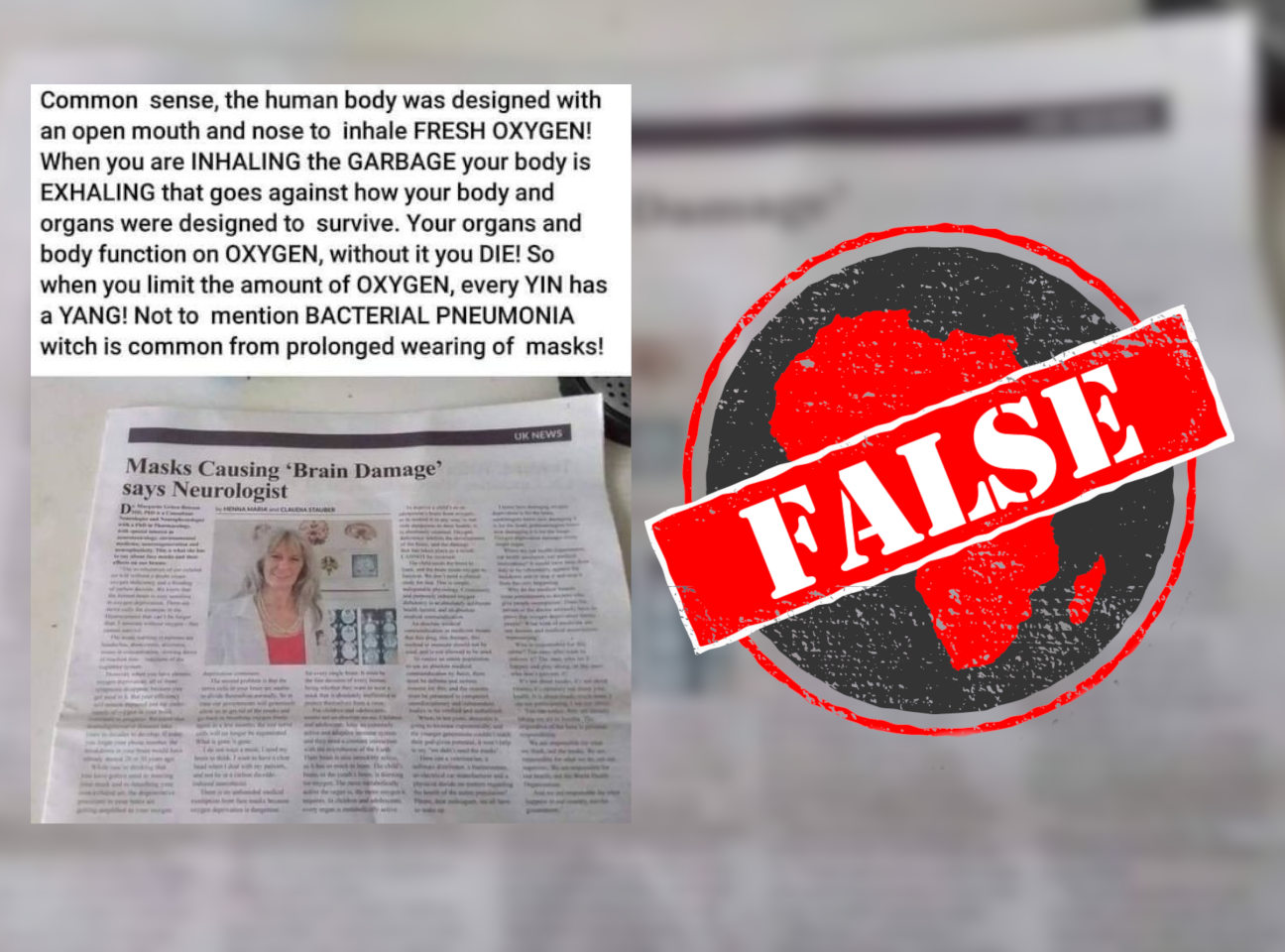A graphic that has been viewed over 4 million times since it was posted on Facebook on 8 January 2021 claims that face masks worn to slow the spread of Covid-19 cause brain damage and bacterial pneumonia, and starve your body and its organs of oxygen.
It includes a photo of a newspaper article with the headline “Masks Causing ‘Brain Damage’ says Neurologist”. Text above the photo claims that wearing a face mask will prevent you from inhaling enough oxygen, cause you to inhale “the GARBAGE your body is EXHALING”, and lead to “BACTERIAL PNEUMONIA witch [sic] is common from prolonged wearing of masks”.
But how much of this is true? Are masks really dangerous to your health?

Masks don’t cause oxygen deprivation
The article in the photo was published in the Light, a free United Kingdom-based newspaper that describes itself as a “truthpaper”.
The Light quoted Margarite Griesz-Brisson, a doctor who has claimed without evidence that wearing face masks “will without a doubt create oxygen deficiency and a flooding of carbon dioxide”.
She says nerve cells in the brain cannot survive without oxygen, and oxygen deprivation can cause damage to the brain and other organs. These claims are paraphrased in the graphic on Facebook, but there is no evidence that face masks limit oxygen to the brain.
Africa Check has debunked similar claims in the past, as have other fact-checking organisations. Doctors and public health authorities have also said that masks are safe to wear and an effective way to slow the spread of Covid-19.
Masks don’t make us breathe in ‘garbage’
The World Health Organization has said that the “prolonged use of medical masks can be uncomfortable”, as healthcare workers who need to wear masks for many hours at a time can attest. But wearing a mask, even for a long period of time, “does not lead to CO2 intoxication nor oxygen deficiency”.
Experts at the Health Desk project created by technology and journalism non-profit Meedan have said: “The claim that the prolonged use of face masks can cause oxygen deficiency, dizziness, or other health challenges is not grounded in science.”
Even extremely airtight, medical-grade protection like N95 masks has not been shown to cause oxygen deprivation or increase carbon dioxide inhalation except in very rare cases, in people with severe health conditions.
Prof Donald Milton of the University of Maryland’s public health school previously told Africa Check that there was “no increase in the ‘intake’ of carbon dioxide” and pointed to many studies that showed mask use was effective at preventing the spread of Covid-19.
To top it all off, many health workers have demonstrated that wearing a mask does not affect blood oxygen levels. One Irish doctor demonstrated that his blood oxygen levels remained stable even as he put on six surgical masks, one over the other.
The Light regularly publishes disproven conspiracy theories and false claims about Covid-19.
These include the disproven claim that a “microchip” developed by Bill Gates will be included in vaccines to “control our minds and bodies”, and the lie that “no one has isolated the Covid-19 virus”, so it doesn’t exist. The genome of the virus was publicly available in February 2020, and there are even photos of the virus taken with an electron microscope.
Masks don’t cause disease – they prevent it
The claim that face masks can cause bacterial pneumonia is also false. It has been repeatedly debunked, as have claims that masks can cause other diseases.
Even simple cloth masks are effective at preventing the spread of Covid-19, and their use is recommended by medical experts.
Republish our content for free
For publishers: what to do if your post is rated false
A fact-checker has rated your Facebook or Instagram post as “false”, “altered”, “partly false” or “missing context”. This could have serious consequences. What do you do?
Click on our guide for the steps you should follow.
Publishers guideAfrica Check teams up with Facebook
Africa Check is a partner in Meta's third-party fact-checking programme to help stop the spread of false information on social media.
The content we rate as “false” will be downgraded on Facebook and Instagram. This means fewer people will see it.
You can also help identify false information on Facebook. This guide explains how.





Add new comment